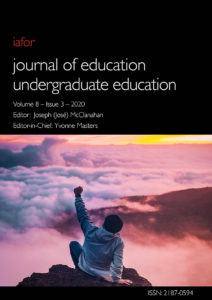IAFOR Journal of Education: Volume 8 – Issue 3 – Undergraduate Education
Editor: Joseph (José) McClanahan
Editor-in-Chief: Yvonne Masters
Published: September 11, 2020
ISSN: 2187-0594
https://doi.org/10.22492/ije.8.3
 As we embark on the first issue of Undergraduate Education for the IAFOR Journal of Education, I am reminded of the changes that we have experienced in our universities and colleges over the last fifty years; and at the same time, I see what has stayed the same. Our academic objectives for students have been, and continue to remain, at the forefront of the work we do. Since the pioneering publication in 1956 of the Taxonomy of Educational Objectives, Harold S. Bloom, whose name is now synonymous with the hierarchical models used to classify educational learning objectives, shared with the world the hard work of a committee of educators who wanted their efforts “to be of general help to all teachers, administrators, professional specialists, and research workers who deal with curricular and evaluation problems” (p. 1). Little did he, or the other members of the committee, know that their work from the 1950s would still be resonating today, especially with those of us who work in undergraduate education. They helped to plant the seeds of what would blossom into the varied, fruitful undergraduate curricular landscape that we enjoy today. The repeated reference to his and the other educators’ work is very relevant. Its imprint is still felt when we design, develop, and implement – whether it is from a single course or an academic unit’s overall curriculum. Their work provided a true scaffolded framework for us. Like many great beginnings, researchers and academics have built, expanded, and extended their ideas to allow for better execution in our current evolving educational environments. As such, we are tasked with the hard work of creatively building upon what has come before us and innovating in our own ways. My hope is that with this issue we can continue the dialogue that informs and enlightens our works as educators.
As we embark on the first issue of Undergraduate Education for the IAFOR Journal of Education, I am reminded of the changes that we have experienced in our universities and colleges over the last fifty years; and at the same time, I see what has stayed the same. Our academic objectives for students have been, and continue to remain, at the forefront of the work we do. Since the pioneering publication in 1956 of the Taxonomy of Educational Objectives, Harold S. Bloom, whose name is now synonymous with the hierarchical models used to classify educational learning objectives, shared with the world the hard work of a committee of educators who wanted their efforts “to be of general help to all teachers, administrators, professional specialists, and research workers who deal with curricular and evaluation problems” (p. 1). Little did he, or the other members of the committee, know that their work from the 1950s would still be resonating today, especially with those of us who work in undergraduate education. They helped to plant the seeds of what would blossom into the varied, fruitful undergraduate curricular landscape that we enjoy today. The repeated reference to his and the other educators’ work is very relevant. Its imprint is still felt when we design, develop, and implement – whether it is from a single course or an academic unit’s overall curriculum. Their work provided a true scaffolded framework for us. Like many great beginnings, researchers and academics have built, expanded, and extended their ideas to allow for better execution in our current evolving educational environments. As such, we are tasked with the hard work of creatively building upon what has come before us and innovating in our own ways. My hope is that with this issue we can continue the dialogue that informs and enlightens our works as educators.
What has changed since 1956 and Bloom’s Taxonomy is how we meet these educational objectives. Our students are not the same. We have had several generations pass through our university doors. The “Baby Boomers” (born 1946-1964), the “Gen X” (born 1965-1980), the “Millennials” (born 1980-1994), and the current ‘Gen Z’ (born between 1995-2015) represent the diversity of our students and the work we do as educators needs to adapt accordingly. The educational circumstances change and how we realize our objectives must follow suit. Each generation has characteristics and qualities that make them unique; as such, it is imperative for us to rethink the ways in which we maintain the same, high academic standards in a new context that engages our students where they are. Noted generational researcher Neil Howe (2014) explains that today’s students possess characteristics such as “having extremely protective parenting, a turn toward traditional parenting, a push for academic achievement, and a renewed focus on social development” (paras. 4-6). Understanding these new contexts of our students permits us to refocus our attention on developing different types of learning opportunities, regardless of the discipline in which we teach. Just as we tell our students that “knowledge is power”, the same idea applies to us. Knowing more gives us the capacity to educate better.
Therefore, I am pleased to introduce you to several researchers who espouse these ideas by thinking about new ways of connecting with students in undergraduate education.
Article 1
In the first article, "Service-Learning as Global Citizenship Education: Acting Locally on Global Challenges and Concerns", Genejane Adarlo examines how the teaching and learning roles of service-learning in the context of social justice can impact students’ assumptions about poverty in different community-based areas, and ultimately, how they can influence and inform global citizenship.
https://doi.org/10.22492/ije.8.3.01
Article 2
In "Social Support for International Students in Foreign Language Classroom Communities of Practice", Takuya Kojima explores how classrooms can reproduce communities of practice to provide social support for international students and to what extent teachers can promote social support within their classrooms.
https://doi.org/10.22492/ije.8.3.02
Article 3
In the third article, “Social Media and E-Portfolios: Impacting Design Students’ Motivation Through Project-Based Learning”, Jae-Eun Oh, Yuet Kai Chan, and Kyulee Kim analyze the impact that social media and e-portfolios can have on undergraduates’ motivation when involved in project-based learning and to what extend they can be an effective tool in the classroom
https://doi.org/10.22492/ije.8.3.03
Article 4
Jennifer Padua and Monica Gonzalez Smith in "Intercultural Communicative Competence in Teacher Education: Cultural Simulation Insights from Hawaiʻi" assess how cultural simulations help promote and develop cultural competence among teacher candidates in a diverse population and how this learning will help to inform future teachers so that they can integrate this awareness into their classrooms.
https://doi.org/10.22492/ije.8.3.04
Article 5
Finally, Paul Sherman and Olivia Boukydis in "Framing Undergraduate Perspectives on Experiential Learning Within Soka Education Theory" bring to light their study of how experiential learning can produce powerful outcomes that support the concept of Soka, value-created education.
https://doi.org/10.22492/ije.8.3.05
These five articles represent the diversity found in our collective undergraduate education landscape today. It is my sincere hope that you will find them insightful and useful for you and your colleagues as we move forward in continual momentum to realize our true academic objectives: creating a positive, intellectual, and fulfilling undergraduate educational experience for our students.
I hope you enjoy reading these articles as much as I enjoyed reviewing them.
Joseph (José) McClanahan
undergrad.editor.joe@iafor.org
Editor, IAFOR Journal of Education: Undergraduate Education

